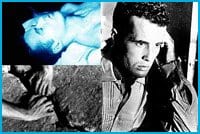When I first saw Kenneth Anger’s Fireworks, I was absolutely shocked that it was made in 1947, when Anger was a young buck of 17. While not the first queer American underground film, Fireworks was certainly among the most overtly homoerotic. Appropriately enough, it is the keystone of Pleasure Dome’s Sat, Jan 28 screening When We Were Very Young, a program of early work by queer North American experimental filmmakers.
Fireworks is classic avant-garde psychodrama in the vein of Maya Deren and Jean Cocteau with a pop-art twist. It blends dream-logic and the tenets and talismans of Aleister Crowley’s Magick rituals — central to Anger’s life and films — with visual puns and gay in-jokes. We should perhaps not be surprised that this groundbreaking film dramatizes the substantial pleasures and dangers of queer desire. Its protagonist, The Dreamer (played by sexy Anger himself), is symbolically destroyed by the heroic icons of post-war masculinity — sailors — whom he lusts after, before being reborn. Fireworks, however, can also be seen as a ceremonial invocation of Lucifer — fire and light are the prevailing motifs.
The film begins with a sleeping man dreaming of being carried by a handsome sailor during a thunderstorm. The strapping lad wakes, surrounded by photos of the dream, and walks into a door marked “Gents,” the universal site for gay cruising. The Dreamer is smitten with a sailor flexing his muscles on a stage (the film constantly shifts its setting), but when he asks for a light, the sailor roughs him up before igniting his fag with a bundle of flaming faggots. A menacing gang of sailors armed with chains then approach and fall upon the boy (to the taut strains of Respighi), breaking his nose, ripping open his guts and squirting his face and chest with goopy white fluid in a scene of apocalyptic sexual violence. Then comes the big Roman candle and Christmas tree money-shot, a conclusion with a bang. According to P Adams Sitney, author of Essential Cinema, Anger claimed: “This flick is all I have to say about being 17, the United States Navy, American Christmas and the fourth of July.” Essential viewing.
Locals make a strong showing in the Pleasure Dome program with Jesus Saves from 1988 by Wrik Mead, Mike Hoolboom’s Song For Mixed Choir from 1980 and Midi Onodera’s The Bird That Chirped On Bathurst from 1981. The rest of the program features US shorts: Scar Tissue by Su Friedrich, Schizy by Barbara Hammer, Ingreen by Nathaniel Dorsky, James Broughton’s Mother’s Day from 1949 and Scotch Tape by Jack Smith from 1959. Admission is $5 and the program starts at 8pm on Sat, Jan 28 at Cinecycle (129 Spadina Ave, down the lane); call (416) 656-5577 or go to Pdome.org.

 Why you can trust Xtra
Why you can trust Xtra


